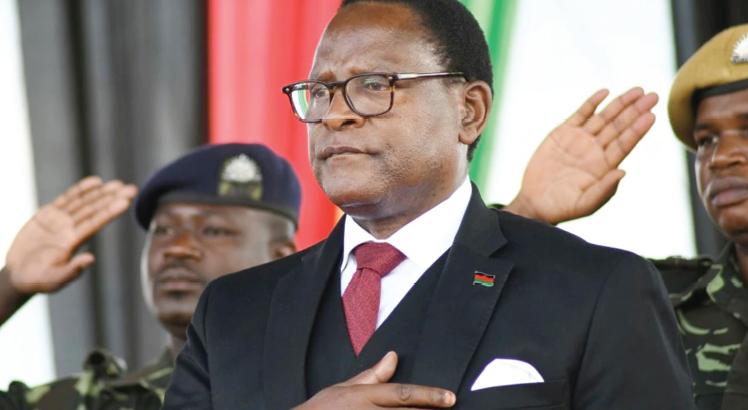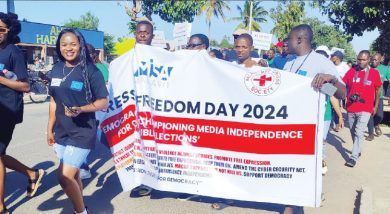Chakwera, others dared on energy
President Lazarus Chakwera and corporate leadership of State agencies responsible for energy have come under fire for their perceived failure to tackle insufficient electricity generation.
In a separate communication as Malawians continue to experience worsening power rationing due to insufficient generation after Tropical Storm Ana damaged Kapichira Hydro Power Station in January, taking off the grid 130 megawatts (MW), Leader of Opposition in Parliament Kondwani Nankhumwa and the Consumers Association of Malawi (Cama) have challenged the leadership to rise to the occasion.
But Minister of Information and Digitisation Gospel Kazako, who is the official government spokesperson, has disputed the assertions and proposals made, saying the Malawi Government has its own strategy on how to tackle the power supply challenges.
In a letter to the President dated August 24 2022, Nankhumwa asked Chakwera to facilitate speedy rehabilitation of Kapichira Hydro Power Station by engaging Malawi Energy Regulatory Authority (Mera) to draw funds from the Malawi Rural Electrification Programme (Marep) basket collected from the fuel levy.

The letter reads in part: “Your government cannot be waiting for money from somewhere else to solve this electricity crisis when Marep has money just lying idle.
“This money is enough to rehabilitate the Kapichira Hydro Power Station as a crisis measure while processes to obtain money from the World Bank or elsewhere are obtained. The reconciliation can be done later.”
Nankhumwa said there cannot be Marep without a solid Electricity Supply Corporation of Malawi (Escom) or Electricity Generation Company (Egenco), as such, fixing Kapichira Hydro Power Station should be prioritised before extending electrification to other areas under Marep.
He was apparently referring to $60 million (about K60 billion) funding that Egenco through the Ministry of Finance secured from the World Bank for the rehabilitation of Kapichira.
Prior to the World Bank committing to provide the funds, the Agriculture and Natural Resources Cluster of Parliament in March also suggested that government must consider channelling K15 billion of the Marep funds for Kapichira rehabilitation.
Presidential press secretary Anthony Kasunda yesterday referred the matter to Kazako who said: “We are uncomfortable to take any pretentious wisdom coming from the very quarters that stood aloof when Escom was being plundered.”
In a separate interview, Malawi University of Business and Applied Sciences economics associate professor Betchani Tchereni described Nankhumwa’s proposal as a dangerous way of managing government coffers.
He said: “It is very dangerous because it is saying people can divert resources anytime they wish depending on what is important and that is what killed Malawi’s economy. Diversion of resources is a very dangerous game, it must not be allowed.”
In a related development, Cama yesterday faulted boards of directors for Escom and Egenco for failing to offer guidance to the institutions and asked the President to intervene as their failure was denting his office’s legacy.
Reads the Cama statement in part: “Unfortunately, all these failures are attributed to you as President and as a result of the choices you have made as President by appointing people that have no capacity to manage strategic institutions.”
And speaking in an interview yesterday, Cama executive director John Kapito said it was doubtful that the country’s leadership understands the implications of erratic supply of electricity on the economy.
“We know how these appointed political boards operate. They cannot think beyond what the appointing authority does, otherwise and it is a big challenge, the buck stops with the President,” he said
Political and social commentator Humphrey Mvula said in an interview yesterday the President should replace boards of directors for Egenco, Escom and Power Marketing Limited for failing Malawians.
“It is evident by the current blackout that these boards plus their managers have completely lost direction. The entire management needs to be replaced,” he said.
Another commentator, Ernest Thindwa, said the country needs boards that can deliver expected results and appointed based on merit consideration, not political appeasement.
He said: “Unfortunately, appointments to statutory corporation board positions are not in most cases driven by the merit. Political expediency seems to take precedence as boards are, in many cases, reduced to an arena for rewarding party loyalists.”
Ever since Kapichira lost 130MW, Egenco has been feeding Escom an average of 220MW while independent power producer JCM Power puts in about 60MW into the national grid, a far cry from the estimated demand of 600MW as indicated in the Malawi Government Annual Economic Report for 2021.
The development has put businesses and households in an awkward situation as they have to spend on alternative sources of energy amid rising cost of living and production.
Malawi Confederation of Chambers of Commerce and Industry president Lekani Katandula told The Nation on Wednesday that businesses will be hard pressed should the rehabilitation of Kapichira prolong.
“From a business perspective, every day of inadequate power supply is very costly. As a business community, we hope that Kapichira will be repaired as quickly as possible,” he said.
Egenco estimated that all things being equal Kapichira should be up and running by December this year, meaning there is a long wait for electricity users.





